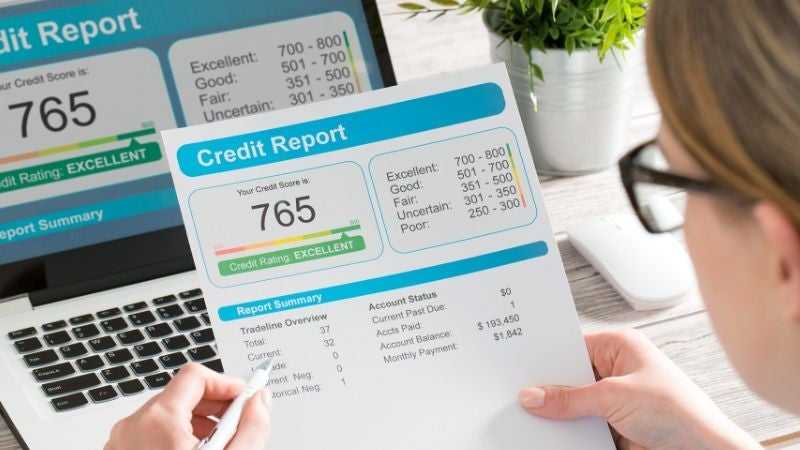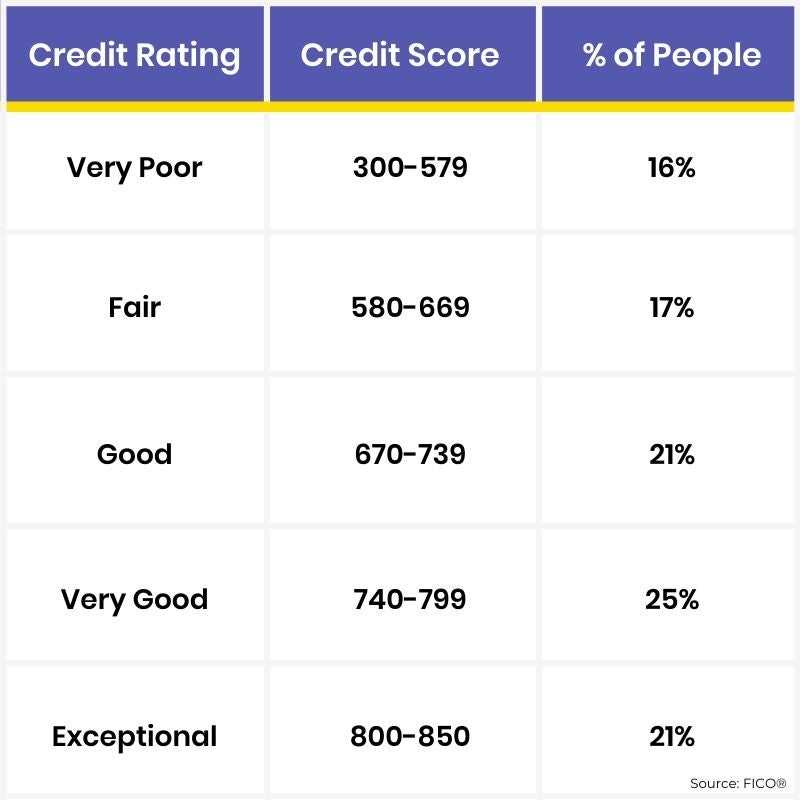How to Improve Your Credit Score in 2020
by Steve

If you’ve ever been told that your credit score wasn’t high enough to rent an apartment, borrow money, or purchase a new car, know that you aren’t alone. I’ve struggled with my credit score in the past, and, according to Experian, one-third of all Americans currently have what’s considered “bad credit.”
It’s in your best interest to do all you can to achieve a good credit score or above — a benchmark many consider to be anything above a 670 credit score — but doing so is easier said than done. But, I promise it’s not impossible. By being smart with your finances and managing your debt, you can slowly start to improve your credit score over time.
There are several steps you can take to either raise your score in the immediate future or get on track to where you’ll see improvement down the road. With these tips, you can start moving the needle toward a good (or even excellent) credit score, but first, let’s go over why it’s beneficial to have a good credit score in the first place.
Why A Good Credit Score is Helpful
Having a good credit score can help you qualify for low interest rates when you take out a loan, get approved for credit cards, and purchase a new home. Most landlords even conduct credit checks when considering potential renters.
Other instances where having a good credit score is important include:
- Getting a job: Many employers will run a credit check during the hiring process to determine your financial responsibility.
- Setting up utilities: Electricity, cable, water, and even cell phone companies will check your credit score before starting services.
- Applying for auto loans: When you apply for an auto loan to purchase a car, the lender will check your credit score to determine the amount you’ll receive and the interest rate on the loan. If you have a good credit score, you’re more likely to receive a larger loan amount at a lower interest rate.
What makes a credit score “good,” you ask? Let’s break it down. FICO® Scores are one of the most well-known types of credit score and are used by many lenders. These scores will range from 300 to 850, with a score of 670 or above considered “good.” The chart below breaks down the different FICO® score ratings and the credit score ranges that apply to each rating. We’ve also included the percentage of people who fall within each range so that you can compare.

Now that we’ve gone over why your credit score is important and what it means to have good credit, let’s dive into how to improve your credit score. These tips can apply no matter where you fall on the scale, from very poor to exceptional.
Keep Up With Payments(!)
Your No. 1 priority, regardless of your credit score, is to always stay on top of your payments. Making a payment past a due date will have an immediate effect on your score, and the more payments you’re late on, the more your score will drop — believe me, I know from experience.
If you’ve fallen behind on payments, the best plan of attack is to simply stay on top of them from here on out. You obviously can’t go back and undo missed payments, but as each month of on-time payments passes, your score will start to reap the benefits. The longer you keep it up, the more your score will improve!
Reduce Your Credit Utilization
The second most important aspect of your credit score is what’s known as your utilization rate. This refers to how much of your available credit you’ve used. For example, if your total credit limit across all your cards is $4,000, and you’re currently sitting at $1,000 of total credit being used on all cards, your utilization rate would be 25%.
Keeping your utilization rate under 30% is considered best, as it demonstrates to lenders that you’re not anywhere near to maxing out your cards while being responsible with your debt amount. To reduce your credit utilization, try to limit your card usage while making larger payments, ideally on credit cards with higher interest rates.

Avoid Unnecessary Inquiries
Have you heard of the term “hard inquiry?” Well, if not, now you have. A hard inquiry is when a potential lender performs a credit check in response to you applying for things like a new credit card, credit account, or loan. Each time they inquire about your credit score, your score will suffer as a result. Seems a little unfair, right? Unfortunately, that’s the reality we all have to deal with.
The occasional hard inquiry may not do much to your score, but multiple inquiries within a short period will trigger red flags to lenders while causing your score to drop even further. These inquiries remain on your record for two years, so try to limit your applications only to cards or loans you absolutely need and that you are highly confident you’ll be approved for.
Negotiate and Pay Off Collection Accounts
Have any of your unpaid debts gone to collections? You’ve probably already seen the effect they can have on your credit score (hint: it’s not good). You’ve also probably gotten all the phone calls and letters in the mail that accompany debts that have defaulted.
While this can be stressful and hang over your head for a number of years, you can almost always negotiate the outstanding amount and settle for a lesser amount, whether you’re paying it off in one payment, or agreeing to a payment plan. Regardless of how you decide to go about it, your score will start to go up once you’ve paid that debt off.
Diversify Your Credit
One of the lesser-known ways to boost your credit score is to mix it up when it comes to your actual credit. This means having credit beyond just a credit card or two, such as an installment loan, car loan, or credit account with certain companies or catalogs. Having a mixture of revolving credit types signals to lenders that you are capable of handling different debts, which reflects on your score.

Keep Any Unused Cards Open
This tip ties in with the utilization rate part, but it’s worth mentioning on its own. It may be tempting to close a credit card once you’ve paid it down to zero or if you no longer wish to use a card, but don’t do it! When you close the card, you’re wiping out the available credit from it too, which impacts your score as we learned earlier. Age of credit is another factor in determining your credit score — the older, the better! If you've had that account for a while and then close it, that could also potentially impact your credit age, which can also impact your score.
Just leave it open. If you get tempted to use it when you shouldn’t be, simply cut it up and throw it away, bury it in your backyard — whatever works! If you get into a bind in the future, you can always request a new card for the account.
Get Yourself Back On Track
So there you have it. No matter how far your credit score has fallen, you can always take some immediate steps to get back on track and set yourself up with a much-improved credit score down the road, unlocking all the opportunities and benefits that go along with it. Even if you can’t follow all the steps above starting off, following just a few will work in your favor and set you up for the rest in the future.
If you find yourself in need of cash in a pinch to pay bills or cover other unexpected expenses, a short-term loan may be the answer. Simply fill out our quick, online application, gather all the necessary documents, and head to your local Cash Store to get cash in hand the very same day.
At the Cash Store, you get more, because you deserve it!
More Articles
What to Know About Crypto-Backed Loans
Curious about using your crypto as collateral? Discover how crypto-backed loans work, their benefits, risks, and what to consider before borrowing.
Read More >How Does Installment Loan Approval Work?
Curious about how installment loan approval works? Learn about the key factors lenders consider, the application process, and tips to improve your chances of approval.
Read More >Is it Better to Get an Installment Loan or Line of Credit?
Installment loan or line of credit—which is right for you? Learn the key differences, pros and cons, and how to choose the best option for your financial needs.
Read More >Loan Amount is subject to loan approval. Loan terms and availability may vary by location. Approval rate based on complete applications received across all Cash Store locations. Customers can typically expect to receive loan proceeds in less than 20 minutes; however, processing times may vary. Loans / Advances are provided based on approved credit. Each applicant for credit is evaluated for creditworthiness.
Please see the Licenses and Rates page for additional product details.
Cash Store offers consumer credit products that are generally short-term in nature and not intended for long-term borrowing needs.
In Texas, Cash Store is a Credit Services Organization. Loans are provided by a non-affiliated third-party lender. Please see the Licenses and Rates page for links to Consumer Disclosures and choose the one for the product and amount that most closely relates to your loan request.
Customer Portal residency restrictions apply. Availability of funds may vary by financial institution.

